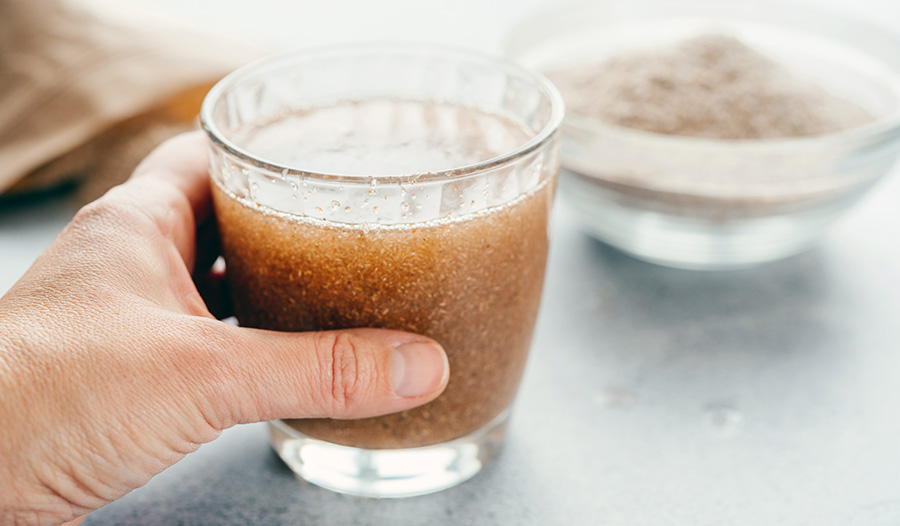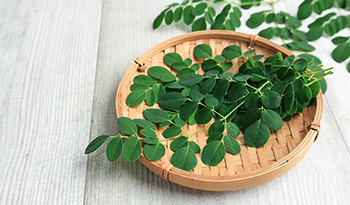Psyllium Husk: Výhody, Použitie a Všetko, čo Potrebujete Vedieť

Kľúčové informácie
- Psyllium šupka je rozpustná vláknina zo semien Plantago ovata, ktorá tvorí gél vo vode.
- Aj keď je psyllium známe ako jemné, hromadné preháňadlo na zmiernenie zápchy, môže tiež pomôcť spevniť stolicu počas hnačky, čo ho robí užitočným pri stavoch, ako je IBS.
- Podporuje tiež zdravie srdca (znižuje hladinu cholesterolu), reguláciu cukru v krvi, reguláciu hmotnosti (prostredníctvom sýtosti) a pôsobí ako prebiotikum pre zdravie čriev.
- Ak chcete bezpečne používať, začnite s malou dávkou (napr. 1⁄2 čajovej lyžičky) a postupne zvyšujte pri pití veľkého množstva vody (najmenej 8 oz na dávku), aby ste zabránili plynu alebo nadúvaniu. Užívajte lieky najmenej dve hodiny od psyllium.
Ako naturopatický lekár veľa hovorím o dôležitosti denného príjmu vlákniny pre optimálne tráviace a celkové zdravie. Keďže väčšina z nás nespĺňa potreby vlákniny nášho tela iba jedlom, často odporúčam šupku psyllium — doplnok prírodnej vlákniny získaný zo semien Plantago ovata, rastliny pôvodom z Indie — ako účinný zdroj rozpustnej vlákniny. Aj keď je šupka psyllium známa ako hromadné preháňadlo, ponúka širokú škálu potenciálnych zdravotných výhod - od podpory zdravého cholesterolu a hladiny cukru v krvi až po podporu zdravia srdca a reguláciu hmotnosti.
V tomto článku preskúmame, čo je šupka psyllium, jej výhody založené na dôkazoch, ako ju bezpečne užívať a čo treba brať do úvahy pri výbere vysoko kvalitného doplnku.
Čo je to Psyllium Husk?
Psyllium šupka, vonkajšia vrstva semien Plantago ovata, je bohatým zdrojom rozpustnej vlákniny. Keď ho zmiešate s vodou, vytvorí gélovú látku, ktorá prechádza tráviacim traktom do značnej miery neporušená, pomáha regulovať pohyby čriev a kŕmi prospešné baktérie vo vašom čreve (alias váš mikrobióm).
Nájdete psyllium v niekoľkých formách:
- Celé semená psyllium: celé semeno rastliny Plantago ovata
- Šupka psyllium: iba vonkajšia vrstva, najkoncentrovanejší zdroj rozpustnej vlákniny
- Psyllium prášok: jemne mletá šupka psyllium pre ľahšie miešanie a absorpciu
Doplnky šupiek psyllium sú dostupné ako prášky, kapsuly, granule a oblátky a sú dokonca začlenené do určitých potravín s vysokým obsahom vlákniny. Medzi obľúbené komerčné produkty psyllium patria Metamucil, Fybogel a ďalšie podobné značky.
Najlepšie výhody šupky psyllium
Aj keď sa to zvyčajne považuje za preháňadlo, účinky psyllium na zdravie idú ďaleko nad rámec tráviacej pravidelnosti. Vďaka svojej jedinečnej vláknine tvoriacej gél ponúka psyllium potenciálnych výhod v celom tele - od čreva až po srdce.
Zmierňuje zápchu
Psyllium pôsobí ako hromadné preháňadlo, absorbuje vodu v črevách a zvyšuje veľkosť a mäkkosť stolice bez toho, aby spôsobovalo nadúvanie. Na rozdiel od stimulačných preháňadiel, ktoré spôsobujú kontrakciu črevných svalov, psyllium pôsobí jemne a práca môže trvať niekoľko dní. Klinický výskum ukazuje, že užívanie doplnkov psyllium je prirodzený spôsob, ako zmierniť zápchu a zlepšiť konzistenciu stolice.1,2
Pomáha pri hnačke
Aj keď je psyllium jemnou a účinnou liečbou zápchy, môže tiež pomôcť pri hnačke absorbovaním prebytočnej tekutiny v čreve a spevnením uvoľnenej stolice. Tento dvojitý účinok z neho robí cenného spojenca pre ľudí so syndrómom dráždivého čreva (IBS), ktorí často striedajú zápchu a hnačku.3
Znižuje hladinu cholesterolu
Psyllium pôsobí ako špongia, zachytáva žlčové kyseliny a cholesterol v tráviacom systéme, pomáha znižovať ich absorpciu a znižuje hladinu cholesterolu. Štúdie ukazujú, že užívanie 6 až 15 gramov denne môže znížiť LDL „zlý“ cholesterol až o 24% a celkový cholesterol až o 20%, najmä u ľudí s vysokým obsahom cholesterolu. 4 Tento účinok je tak dobre preukázaný, že FDA umožňuje tvrdenie o zdraví srdca, ktoré uvádza, že vláknina psyllium môže znížiť riziko srdcových chorôb, ak sa užíva ako súčasť stravy s nízkym obsahom nasýtených tukov a cholesterolu.
Podporuje zdravie srdca
Okrem cholesterolu môže psyllium pomôcť znížiť krvný tlak, najmä u pacientov s hypertenziou.6 Môže tiež pomôcť zlepšiť celkové zdravie srdca. Rozsiahly prehľad dobre navrhnutých štúdií zistil, že psyllium významne zlepšilo miery kardiovaskulárneho rizika vrátane zníženia inzulínovej rezistencie a hladiny cukru v krvi.7
Pomáha riadiť hladinu cukru v krvi
Ak máte cukrovku 2. typu, psyllium môže pomôcť spomaliť vstrebávanie sacharidov a znížiť skoky cukru v krvi po jedle. Prehľad štúdií zistil, že užívanie najmenej 10 gramov psyllium významne znížilo hladinu cukru v krvi nalačno a hemoglobín A1c, čo je miera hladiny cukru v krvi v priebehu času. 8 Ak máte cukrovku, poraďte sa so svojím poskytovateľom zdravotnej starostlivosti pred užitím psyllium, aby mohol sledovať meniace sa hladiny cukru v krvi a pomôcť zvládnuť váš stav.
Pomáha pri regulácii hmotnosti
Tým, že vám pomôže cítiť sa plnšie dlhšie, môže psyllium znížiť chuť do jedla a celkový príjem kalórií, čím podporuje reguláciu hmotnosti. Prehľad štúdií z roku 2023 zistil, že užívanie asi 11 gramov šupky psyllium denne pred jedlom počas takmer piatich mesiacov výrazne znížilo telesnú hmotnosť a obvod pásu u ľudí s nadváhou a obezitou.9 Aj keď sa výsledky líšia, výskum podporuje jeho použitie ako súčasť komplexného plánu riadenia hmotnosti.
Pôsobí ako prebiotikum
Ako prebiotikum, psyllium podporuje čriev, imunitný systém a celkové tráviace zdravie. Prebiotiká živia prospešné črevné baktérie, podporujú rôznorodý črevný mikrobióm a stimulujú produkciu mastných kyselín s krátkym reťazcom (SCFA), ako sú butyrát a propionát, ktoré vyživujú črevnú výstelku a môžu pomôcť zmierniť zápal.10
Ako užívať Psyllium Husk
Psyllium je jednoduchý spôsob, ako zvýšiť príjem vlákniny - ale začnite nízko a choďte pomaly! Príliš rýchle pridanie príliš veľkého množstva vlákniny môže spôsobiť nadúvanie alebo nepríjemné pocity. Začnite asi 1⁄2 čajovou lyžičkou a postupne pracujte až asi 5 až 10 gramov denne s jedlom, v závislosti od vašich cieľov.
Psyllium je dostupné v kapsulách alebo vo forme prášku, ktorý sa môže zmiešať so pohárom vody. Pri doplňovaní akoukoľvek formou psylia nezabudnite piť veľa vody - najmenej 8 uncí - a pokračujte v hydratácii po celý deň.
Psyllium môžete užívať kedykoľvek, ale je to obzvlášť účinné pred jedlom, ak je vaším cieľom regulácia hmotnosti alebo cukru v krvi. Ak užívate lieky, nezabudnite ich oddeliť najmenej dve hodiny od psyllium.
Koľko šupky psyllium by ste mali užívať denne?
Väčšina z nás - až 97% - nekonzumuje dostatok vlákniny, podľa stravovacích pokynov pre Američanov.11 Ženy a muži potrebujú asi 25 až 38 gramov vlákniny denne, napriek tomu je priemerný príjem iba 15 gramov. Ako zdroj rozpustnej vlákniny môže psyllium pomôcť preklenúť túto medzeru.
Tu je, koľko by ste mali vziať denne, v závislosti od vašich cieľov:
- Všeobecná podpora vlákien: 5 až 10 gramov
- Úľava od zápchy: 7 až 4 gramy
- Manažment cholesterolu: 10 až 15 gramov
- Rovnováha cukru v krvi: 10 gramov pred jedlom
Pamätajte, že ak nie ste zvyknutí dostávať veľa vlákniny, začnite pomaly budovať svoju toleranciu a vyhnite sa nepríjemnému nadúvaniu.
Vedľajšie účinky a preventívne opatrenia Psyllium Husk
Psyllium je bezpečné pre väčšinu ľudí, ak sa používa správne, ale môže spôsobiť mierne účinky, ako napríklad:
- Plyn a nadúvanie (najmä pri začatí)
- Kŕče v bruchu
- Zmeny vo frekvencii pohybu čriev
- Nevoľnosť
Zriedkavé, ale závažné vedľajšie účinky môžu zahŕňať:
- Alergické reakcie (žihľavka, ťažkosti s dýchaním)
- Dusenie (ak sa užíva príliš malým množstvom vody)
- Črevná blokáda
Vyhnite sa psyllium, ak máte upchatie čriev, ťažkosti s prehĺtaním alebo ochorenie obličiek. Psyllium môže ovplyvniť vstrebávanie určitých liekov, preto sa poraďte so svojím lekárom pred užitím šupky psyllium a rozložte lieky najmenej dve hodiny pred alebo po doplnení.
Psyllium Husk vs. Ostatné doplnky vlákniny
Psyllium šupka je vynikajúcim zdrojom rozpustnej vlákniny , ktorá pomáha zmierňovať zápchu aj hnačku, podporuje zdravie srdca a metabolizmu a slúži ako prebiotikum na zlepšenie zdravia čriev. Tu je návod, ako sa psyllium porovnáva s inými typmi doplnkov vlákniny.
| Typ vlákna | Zdroj | Kľúčové výhody |
|---|---|---|
Psyllium | Vajcová rastlina | Zápcha + hnačka; zdravie srdca; metabolické zdravie; prebiotikum |
Metylcelulóza | Celulóza | Hromadné preháňadlo; jemné, nefermentovateľné (menej plynu) |
Pšeničný dextrín | Pšeničný škrob | Fermentovateľné (môže spôsobiť nadúvanie + plyn); nie je účinný pri hnačke |
Inulín | Koreň čakanky/jeruzalemský artičok | Prebiotické, metabolické a zápalové výhody |
Chia alebo ľanové semienka | Semená | Bohaté na omega-3 mastné kyseliny |
Kde kúpiť kvalitnú šupku z psyllium
Pri výbere doplnku šupky psylliumhľadajte čisté psyllium bez pridaných umelých farbív alebo sladidiel. Rozhodnite sa pre tie, ktoré sú organické a neoverené GMO. A rovnako ako pri každom doplnku hľadajte taký od renomovanej značky, ktorá je testovaná treťou stranou z hľadiska kvality a čistoty.
Doplnky psyllium sú dostupné v kapsulách, práškoch (ochutených alebo obyčajných) alebo celých šupiach. Psyllium skladujte na chladnom a suchom mieste, aby ste zachovali čerstvosť.
Často kladené otázky o Psyllium Husk
Môžem užívať šupku psyllium každý deň?
Áno, užívanie šupky psyllium denne je bezpečné pre väčšinu ľudí, ak je sprevádzané primeranou hydratáciou.
Ako dlho trvá, kým šupka psyllium funguje?
Psyllium je jemné, prirodzené preháňadlo a môže trvať až tri dni, kým sa vytvorí pohyb čriev.
Môže psyllium spôsobiť zápchu?
Výskum ukazuje, že psyllium je účinný spôsob, ako zmierniť zápchu, keď sa užíva veľkým množstvom vody. Ak sa psyllium užíva bez dostatočného množstva tekutín, môže absorbovať príliš veľa vody v črevách, čo vedie k tvrdej a suchej stolici.
Je šupka psyllium vhodná k ketónom?
Áno, šupka psyllium má nízky obsah čistých sacharidov a je dobrým zdrojom vlákniny pre tých, ktorí dodržiavajú keto diétu.
Môžu to deti vziať?
Aj keď je šupka psyllium bezpečná pre väčšinu detí, vždy sa poraďte s pediatrom predtým, ako dáte dieťaťu psyllium, aby ste zaistili správne dávkovanie a bezpečnosť.
Základný riadok
Psyllium šupka je prírodným zdrojom prebiotickej vlákniny rozpustnej. Od podpory pravidelnosti až po podporu zdravia srdca, metabolizmu a čriev je doplnenie šupkou psyllium účinným spôsobom, ako zvýšiť príjem vlákniny a zlepšiť zdravie.
Pamätajte, že pri prvom užívaní šupky psyllium začnite pomaly a pite veľa vody, aby ste predišli nadúvaniu a dajte tráviaciemu systému čas prispôsobiť sa zvýšenému príjmu vlákniny. Aj keď je psyllium bezpečné pre väčšinu ľudí, poraďte sa so svojím poskytovateľom zdravotnej starostlivosti pred užitím psyllium, ak máte chronické stavy alebo užívate lieky.
Referencie:
- Jalanka J, major G, Murray K a kol. Účinok šupky psyllium na črevnú mikrobiotu u pacientov so zápchou a zdravých kontrolných skupín. Int J Mol Science. 2019; 20 (2): 433.
- Van Der Schoot A, Drysdale C, Whelan K, Dimidi E. Vplyv suplementácie vlákniny na chronickú zápchu u dospelých: aktualizovaný systematický prehľad a metaanalýza randomizovaných kontrolovaných štúdií. Americký časopis klinickej výživy. 2022; 116 (4): 953-969.
- Przybyszewska J, Kuźmiński A, Przybyszewski M, Popławski C. Úloha a terapeutická účinnosť šupky Plantago ovata (psyllium šupka) pri prevencii a nefarmakologickej liečbe gastrointestinálnych ochorení. Časť 2. Klinické použitie šupky psyllium pri liečbe zápchy a hnačky. Prz Gastroenterol. 2025; 20 (2): 121-126.
- Lambeau KV, McRorie J. W. Doplnky vlákniny a klinicky dokázané zdravotné prínosy: Ako rozpoznať a odporučiť účinnú vláknovú terapiu. J Am doc. sestra Pract. 2017; 29 (4) :216.
- eCFR :: 21 CFR 101.81 -- Zdravotné tvrdenia: Rozpustná vláknina z určitých potravín a riziko ischemickej choroby srdca (CHD). Prístup k 26. októbru 2025.
- Clark CCT, Salek M, Aghabagheri E, Jafarnejad S. Vplyv suplementácie psyllium na krvný tlak: systematický prehľad a metaanalýza randomizovaných kontrolovaných štúdií. Kórejský J Intern Med. 2020; 35 (6): 1385.
- Gholami Z, Paknahad Z. Priaznivé účinky psyllium na kardiovaskulárne ochorenia a ich rizikové faktory: Systematický prehľad a metaanalýza dávky a odpovede randomizovaných kontrolovaných štúdií. J Funct Foods. 2023; 111:105878.
- Gholami Z, Clark CCT, Paknahad Z. Účinok psyllium na hladinu cukru v krvi nalačno, HbA1c, HOMA IR a kontrolu inzulínu: systematický prehľad hodnotený stupňom a metaanalýza randomizovaných kontrolovaných štúdií. BMC Endocr Disord. 2024; 24 (1) :82.
- Gibb RD, Sloan KJ, McRorie JW. Psyllium je prírodné nefermentované vlákno tvoriace gél, ktoré je účinné pri chudnutí: Komplexný prehľad a metaanalýza. J Am doc. sestra Pract. 2023; 35 (8): 468.
- Przybyszewska J, Kuźmiński A, Przybyszewski M, Popławski C. Úloha a terapeutická účinnosť šupky semien Plantago ovata (psyllium šupka) pri prevencii a nefarmakologickej liečbe gastrointestinálnych ochorení. Časť 1. Klinické použitie šupky psyllium pri liečbe syndrómu dráždivého čreva, ulcera. Prz Gastroenterol. 2024; 19 (2): 121.
- Diétne pokyny pre Američanov. Prístup k 27. októbru 2025.
VYHLÁSENIE: Toto Centrum zdravia a pohody neposkytuje diagnózu,...
















































































 Obsah
Obsah















